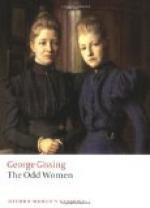Drawing near to Queen’s Road—the wrapped-up Keble in her hand— she began to wonder whether Miss Nunn would have any serious proposal to offer. Virginia’s report and ecstatic forecasts were, she knew, not completely trustworthy; though more than ten years her sister’s junior, Monica saw the world with eyes much less disposed to magnify and colour ordinary facts.
Miss Barfoot was still from home. Rhoda Nunn received the visitor in a pleasant, old-fashioned drawing-room, where there was nothing costly, nothing luxurious; yet to Monica it appeared richly furnished. A sense of strangeness amid such surroundings had more to do with her constrained silence for the first few minutes than the difficulty with which she recognized in this lady before her the Miss Nunn whom she had known years ago.
‘I should never have known you,’ said Rhoda, equally surprised. ’For one thing, you look like a fever patient just recovering. What can be expected? Your sister gave me a shocking account of how you live.’
‘The work is very hard.’
‘Preposterous. Why do you stay at such a place, Monica?’
‘I am getting experience.’
‘To be used in the next world?’
They laughed.
‘Miss Madden is better to-day, I hope?’
‘Alice? Not much, I’m sorry to say.’
’Will you tell me something more about the “experience” you are getting? For instance, what time is given you for meals?’
Rhoda Nunn was not the person to manufacture light gossip when a matter of the gravest interest waited for discussion. With a face that expressed thoughtful sympathy, she encouraged the girl to speak and confide in her.
‘There’s twenty minutes for each meal,’ Monica explained; ’but at dinner and tea one is very likely to be called into the shop before finishing. If you are long away you find the table cleared.’
’Charming arrangement! No sitting down behind the counter, I suppose?’
’Oh, of course not. We stiffer a great deal from that. Some of us get diseases. A girl has just gone to the hospital with varicose veins, and two or three others have the same thing in a less troublesome form. Sometimes, on Saturday night, I lose all feeling in my feet; I have to stamp on the floor to be sure it’s still under me.’
‘Ah, that Saturday night!’
’Yes, it’s bad enough now; but at Christmas! There was a week or more of Saturday night—going on to one o’clock in the morning. A girl by me was twice carried out fainting, one night after another. They gave her brandy, and she came back again.’
‘They compelled her to?’
’Well, no, it was her own wish. Her “book of takings” wasn’t very good, poor thing, and if it didn’t come up to a certain figure at the end of the week she would lose her place. She lost it after all. They told her she was too weak. After Christmas she was lucky enough to get a place as a lady’s-maid at twenty-five pounds a year—at Scotcher’s she had fifteen. But we heard that she burst a blood-vessel, and now she’s in the hospital at Brompton.’




